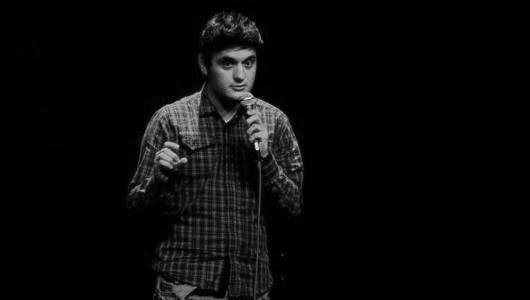Those Funny Foreigners

George Zach
I’d like to start this article with a question: Can you name a sitcom that’s in Welsh? Welsh speakers need not answer that question.
One possible answer would’ve included the football-based sitcom C’mon Midffild which ran on BBC Radio Cymru before being adapted for S4C, running for six series. There’re probably more correct answers, but I don’t know any, and chances are that you don’t know any either (unless you speak Welsh, in which case I apologise for my ignorance and that of my fellow non-Welsh speakers).
The strange thing is that Britain is a country that speaks more than one tongue, but comedies in languages such as Welsh or Scottish Gaelic are never shown to a wider audience. I work for the British Comedy Guide and not even we cover comedies on S4C or other similar networks because we know so little about them.
Also, in terms of comedy imports, the vast majority of what we see comes from the USA. Only on the odd occasion do you see stuff from other English speaking countries, and you hardly ever see anything that comes from a non-English speaking country. There are exceptions, of course. For example, panel game The Bubble was invented in Israel.
In terms of stand-up it’s even more limited because you are performing to English speaking audiences. Sometimes you get to see stand-up performed in other languages, such as Eddie Izzard performing in French. However, in the UK, foreign stand-ups such as Germany’s Henning Wehn and Dutchman Hans Teeuwen perform in English.
It has to be pointed out, though, that performing in English varies from comic to comic. Greek born stand-up George Zach is at ease with the challenge. “My English,” he told me, “grammatically and from a vocabulary perspective is of a high standard. I’ve mainly got English friends while in the UK so I can relate to the cultural references, and I think I can understand the British sense of humour, too.
“I think the biggest barrier is my accent. I find that audiences need around a minute to adjust, so no matter what I do at the beginning, the first jokes are always going to struggle just because everyone is kind of taken aback – which is a natural response, so I have had to work round that by essentially making it part of my routine.”
Zach also said that he doesn’t perform in his native Greek tongue on stage. “I don’t see a reason why I should be speaking in a language people don’t understand,” he said, “unless there is comedic value and if so, I haven’t yet found any. Also, the accent is quite a thing already; being Greek pops up a couple of times in my set, so if I speak Greek on stage then I’ll just become an ethnic act and I’m trying to avoid that.”
Næturvaktin (The Night Shift)
While we hardly ever see comedies in other languages, recently BBC Four did show a foreign sitcom– the Icelandic Næturvaktin (The Night Shift).
Næturvaktin is a hugely popular show in Iceland. It’s the first in a trilogy of sitcoms, the others being Dagvaktin (The Day Shift) and Fangavaktin (The Prison Shift), which were also followed by the film Bjarnfreðarson…which beat Avatar at the Icelandic box office. There’s also been an attempt to remake the show in the USA. Jón Gnarr, the main star of the show, has since gone on to set-up his own joke political party and has since been elected mayor of Reykjavík.
Næturvaktin focuses on the staff who work the night shift in a Shell petrol station just outside Reykjavík: Georg Bjarnfreðarson (Gnarr) an eccentric, over-educated Communist boss, bullied employee Ólafur (Pétur Jóhann Sigfússon), and new boy and medical school drop-out Daníel (Jörundur Ragnarsson).

The Night Shift
Having watched the series (all episodes are currently available on the BBC iPlayer), the best way to describe Næturvaktin is that it’s a slow-burner. It’s not a laugh-a-minute show, and it’s hard to get some of the references without having to double check everything on the internet. For example, there’s one episode in which Ólafur attempts to go on the Icelandic version of The X Factor, which guest stars one of the judges who, like most famous Icelandic people, I’ve never heard of.
However, the plot does develop nicely. As the series goes on Daníel stands up to Georg’s bizarre demands, and Georg’s behaviour becomes increasingly erratic. The series also features scenes that you couldn’t imagine being done in British comedy shows these days. For example, Ólafur is constantly smoking, even in the petrol station’s forecourt. There’s even a scene when Ólafur encourages Georg’s young son Flemming to smoke to prevent people from bullying, and Flemming is shown smoking. The only time I can recall underage smoking in a sitcom is in Open All Hours…
I’m personally annoyed by the lack of risks that broadcasters are taking when it comes to broadcasting comedy from abroad, but Zach says that broadcasters should cautious. “There’re people who would argue that if something is funny, it’s funny no matter what. But, there are many, many comedy routines that are based on the collective experiences of audiences that share the same language, cultural references, places, accents, behaviours and so on. If people aren’t in tune with the country’s specifics they are going to miss that. How would George Carlin’s routine about stupid things in the English language translate? Or Ricky Gervais’ satire on our PC culture?
“Granted, there are comedians like Adam Bloom, or Jerry Seinfeld, whose jokes can easily translate, but then their delivery, punctuation and rhythm are part of the routine and you cannot subtitle that. It’s hard to think of English speaking comedians translated for audiences not familiar with the Western culture or language or way of life, so why would it be easier the other way round?”
It is true that there are problems with the cultural barrier, like my misunderstanding of the Icelandic X Factor, and perhaps the only way to avoid this problem is to find comedies which cover universal events, or things which are totally fictional.
Luckily, I happen to know of two comedies which display both traits, both of which are Japanese anime. Anime has a problem in this country in that people either think its all kids stuff like Pokémon, or violent, pornographic material. The only anime that ever really gets shown in the UK are children’s films, mostly on Film4. However, there’s a whole lot of stuff in-between the children’s and adult entertainment sections.
Hetalia
You can get an idea of what the show is about from the complete title – Hetalia: Axis Powers. Yes, it is a comedy, by the Japanese, about World War Two. It also covers other historical events, thus making it one of the few historical comedies to cover in depth the War of the Austrian Succession.
To be honest, I can’t imagine any network in Britain showing Hetalia. Not because it wouldn’t get good ratings or because of the shortness of the episodes (they are five minutes long each), but because all the characters are stereotypical personifications of countries, and therefore they’d be worried about offending… well, just about everyone really. But despite this, both printed volumes of the comic have topped The New York Times manga best seller list.
Hetalia features lots of gags poking fun at other countries, and also Japan itself. The main character is “loveable loser” North Italy (the title is a portmanteau of the “Italia” and the Japanese word for “pathetic” or “unskilled”), who is depicted as cowardly. France, however, is romantic and constantly making passes at other people. Germany is bureaucratic and does everything by the book, and Japan itself is over-polite and suffers from culture shock. Meanwhile, England is depicted as being foul-mouthed, terrible at cooking, and having an obsession with the supernatural (Scotland, Wales and Ireland have yet to appear in the series).

Hetalia
Having read the manga and seen the anime, I don’t personally think that it’s racist primarily because Japan includes itself in the joke, rather like the way someone like Jerry Sadowitz mocks himself in his stand-up. It’s certainly less offensive than a show like It Ain’t Half Hot Mum or Mind Your Language, and is a lot more “educational”. (I stress the quotation marks by the way as it is not historically accurate all the time).
Hetalia is an example of a show that couldn’t be remade over here. I could imagine a show about different countries around the world, trying to be educational – like a geographical version of Horrible Histories. But even if you made England’s portrayal the most stereotypical in the show, or if you didn’t include any stereotypes at all, you would still get Disgusted of Tunbridge Wells making complaints, as well as Annoyed of Glasgow, Cheesed-Off of Swansea and Furious of Cork.
I should at this point state that I totally support political correctness; I’m just of the opinion that if everyone is treated the same, it shouldn’t be offensive, and everyone should be okay.
The first two seasons of Hetalia are on DVD and the most recent seasons (known as Hetalia: World Series) are available to watch on YouTube via the Funimation account. The first two printed books are available in English, but publisher TokyoPop have recently stopped publishing works in English. It is not yet known who will publish future volumes.
Gurren Lagann
As for completely fictional comedy, my favourite such example, and indeed my favourite comedy in a foreign language, is sci-fi comedy drama Gurren Lagann, a cross between Transformers and a Carry On film.
The series is set in a post-apocalyptic future and focuses on a young boy called Simon (pronounced “See-mon” in Japanese), who helps lead a rebellion to guide humans from their sheltered existence below ground. However, in reality it’s really about bombastic macho-ness, ludicrously over-the-top scenarios, and really, really big drills.
I love this show because everything in it’s so ridiculous. One character in the show, Kamina, is the most bombastic character I can think of, with lines such as, “Reject common sense to make the impossible possible!” and “Don’t believe in yourself – believe in me that believes in you!” Kamina would probably be the world’s best motivational speaker if he had not decided to fight huge humanoid robots piloted by animal like “beastmen”.

Gurren Lagann
In terms of the Carry On style of comedy, certain bits are immediately recognisable to us Brits. My favourite episode in terms of comedy is the sixth, in which Simon, Kamina, and the friends they have gathered during their travels on the surface, come across a bathhouse. Kamina for most of the second half of the show is constantly trying to look at the women bathing. However, they discover that the bathhouse is actually an enemy robot and all the women are kidnapped.
So Simon and Kamina fight off the machine, while Kamina keeps trying to look at the women naked, but every times he tries, he fails. He sees a blurred video of them, but when it is made clear they are all wearing towels. When the towels are rid off, they’re all wearing bikinis underneath so Kamina still fails once more. After this entire scenario finishes, the female lead, Yoko, begins to celebrate but her bikini flies off Barbara Windsor style. If only you could add Sid James laughing it would be perfect.
One thing I like about the series is how it switches from the most dramatic situations to comic ones and vice versa. For example, you can have a scene where everyone is fighting the enemy, and there is horror, pain, terror, violence, blood and death – totally dramatic and gripping. And then out of all this chaos, you see a small, furry, mole-like creature, who is trying to seek shelter from all the hurt. And he does find it; he finds safety – by hiding in a huge pair of tits. Cue Sid James laughing.
Yes, it’s not the most sophisticated comedy that’s ever been filmed, but what’s wrong with being a bit cheeky now and then? Not only is it rather amusing, but the drama in the show is, at times, surprisingly moving, especially towards the end of the series. I’d encourage anyone not familiar with the anime genre to give it a try, especially Hetalia and Gurren Lagann.
The entire Gurren Lagann is available on DVD, with film versions currently available on DVD as well, but only in Region 1. Printed manga are also available, with five English volumes printed so far, with a sixth to come out in August.
Personally, I’d welcome more comedy from abroad, primarily because I think it would be good to broaden the cultural horizons of not only British people but British writers, too. After all, anything’s got to be funnier than the current series of Life of Riley.



































